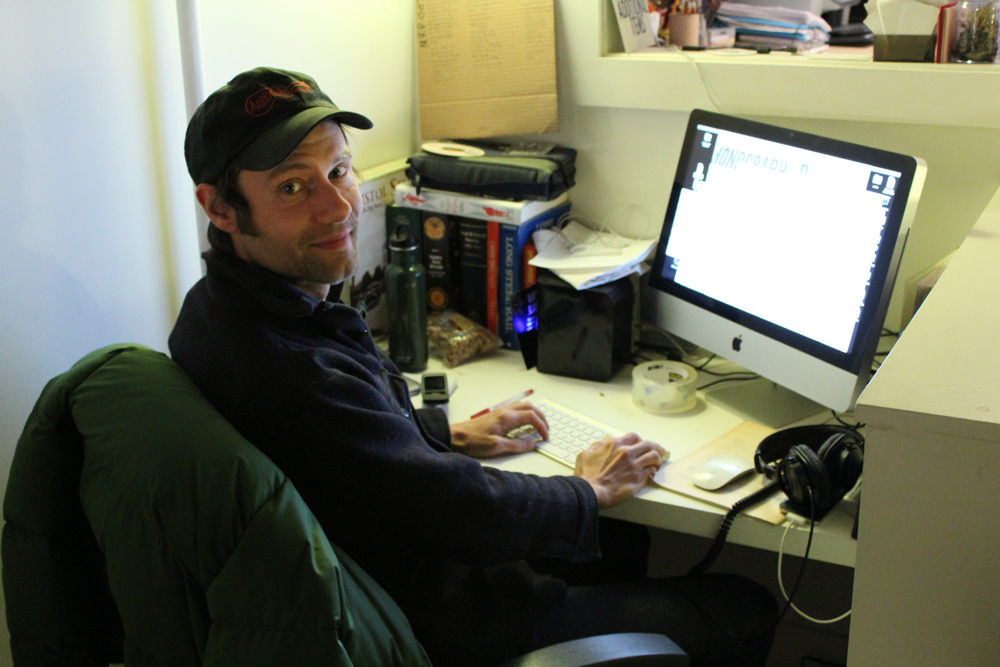Nathan Salsburg is a producer, guitarist, and Curator of the Alan Lomax Archive. He lives between Portland, Me., and Louisville, Ky., and is guest-blogging this week as SPACE’s Arts Administrator in Residence.
Needing a spot to set up shop during a month-long visit to Portland in March 2012, I was not only offered a desk, an internet connection, and a key by Nat and the SPACE gang, but I was also dubbed the inaugural Arts Administrator in Residence. That month was a productive one, offering a much-needed change of scenery, pace, and rigor than what I was used to, working alone back home in Louisville, and when I relocated to Portland this past November, I was blessed by an extension of the residency. I insisted—and continue to insist—that I can wash dishes, clean bathrooms, tend bar, stuff envelopes; whatever might help me earn my keep. But I’ve only been asked, so far, to do this: to guest blog this week.
Perhaps it’s an irony that SPACE’s first resident arts-administrator works not at all with contemporary art. In fact I spend most of my time with its opposite: vintage recordings of traditional and vernacular music. But my mission, both as Curator of the Alan Lomax Archive and as an independent producer, is a contemporary one, namely to find new  outlets, audiences, and applications for this material, while also assuring that the players, singers, communities, and contexts from whence the music came are acknowledged, respected, and, when applicable, remunerated. Alan Lomax (right) called this the pursuit of “cultural equity,” and the practice “cultural feedback.”
outlets, audiences, and applications for this material, while also assuring that the players, singers, communities, and contexts from whence the music came are acknowledged, respected, and, when applicable, remunerated. Alan Lomax (right) called this the pursuit of “cultural equity,” and the practice “cultural feedback.”
Once heard, though, the music does much of its own work. The immediacy, intensity, and vitality that marks the best of it are its own recommendation to contemporary culture. That such an enormity of venerable rural ballads, songs, and dances has endured is a wonder; that they have endured with so much emotive impact intact often seems like a miracle. My posts here will focus on several performances, drawn from far-flung locales, traditions, and sources, that have worked their magic on me — most for years, though one for just a week now — and that I think succinctly illustrate that miraculousness. I hope you enjoy them.
*
My time at SPACE last Spring, when it wasn’t being spent on behalf of the Lomax Archive, was devoted to compiling a box-set project called Work Hard, Play Hard, Pray Hard: Hard Time, Good Time & End Time Music, 1923–1936, ultimately released on the Tompkins Square label in November. I’ve written elsewhere about the nearly 3000 78rpm records of early country music that (speaking of miracles) came into my possession in 2010, only just barely dodging a trip to the landfill, and that thereafter formed the basis of the 3-CD/LP set, the thematic arc of which can hopefully be grasped without too much trouble with a look at its title.
I had put the compilation of the thing off for as long as I could, begging for deadline extensions — despite the fact that it simply requires listening to records, I find it often to be exhausting work, and back home in Louisville I invented all manner of excuses to delay. But one title sat confidently on top of the working sequences I slowly scrawled on a cardboard record flat I carried with me nearly everywhere for several months, and that I dutifully brought to SPACE. It was, and remains, the one record I’d save, if I had to save one, from the entire salvaged collection — and many days it’d be the only record I’d save from my entire collection. Its two parts are full of pathos, humanity, and moments of levity, while an ineffable thread of melancholy runs through it, exemplified by the mule that appears in Part 2; so reminiscent, to these romantic sensibilities, of the star of Robert Bresson’s Au Hasard Balthasar.
“You’d holler too like that if you was to get left.”
I write this about “Flat Wheel Train Blues” in the liner notes to the set, in which it was reissued for the first time since its original release in 1930:
While there were no shortage of train-imitation pieces recorded in the late ‘20s and early ‘30s, they were usually blown on harmonicas, not scratched out on fiddles. The “Flat Wheel Train Blues,” its two parts cut in Atlanta in 1930, features the emotive, locomotive whistle of Red Gay’s fiddling backed by the chugging right hand of Jack Wellman on guitar, serving as both the train itself and the thumping of the flat tread on one of its cars. They steam over hills, through crossings, past a lonesome mule, and eventually into the yard—a patchwork of sound at once prosaic (it’s the sound of work, after all), playful, and somehow deeply melancholy. The familiarity the duo displays with the machinations of a train crew suggests that at least one of them had spent time on one—indeed, a Jack Wellman whose vital dates could have placed him at this Atlanta session appears in the Retired Railroad Workers rolls of the Social Security Administration. Born in Kentucky, he was for some time based in Mingo County, West Virginia, almost certainly working in some capacity with coal-haulers. If and how he made his way down south to meet up with Red Gay—who fronted the Brown Jug Fiddling Band out of Tampa, Florida—is a mys- tery. This transcendent record is the only document of their time together.


